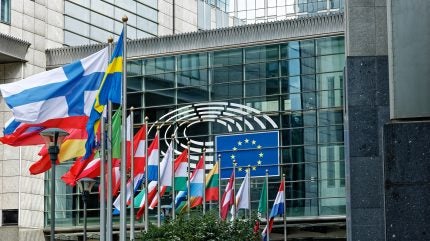
The PFAS ban, which EU Environment Commissioner Jessika Roswall told Reuters in a recent interview, could come with certain allowances for critical industry applications.
The EU’s draft for this regulation is not anticipated to be finalised until next year at the earliest due to the need to define what constitutes “essential” exceptions, Roswall noted.
She was quoted by the news agency as saying: “What we know we are looking for is a ban in consumer products.
“This is something that is important for us human beings, of course, but also for the environment, but I think also for the industry so they know how they can phase out PFAS.”
A spokesperson for the EU Commission told Just Style: “Stakeholders have reported that certain uses where there are currently no alternatives to PFAS are needed in key technologies, for example, in the energy and mobility sectors (including batteries), in the chemical sector, in the medical and pharmaceutical sectors, and in electronics, in particular in technologies needed for the twin transition or for maintaining the EU’s strategic autonomy.
“In view of the investment uncertainty that a long-running decision-making process can create, the Commission is actively communicating this intention to interested parties while the process is ongoing to prevent discouraging investments essential for the twin transition and strategic autonomy.

US Tariffs are shifting - will you react or anticipate?
Don’t let policy changes catch you off guard. Stay proactive with real-time data and expert analysis.
By GlobalData“The Commission would support the ban of the use of PFAS in consumer uses, like cosmetics, food contact materials and outdoor clothing. Where adequate alternatives in terms of performance and safety are not available, the Commission would support the continued use of PFAS in industrial applications, in particular critical ones, under strictly controlled conditions until acceptable substitutes are found. This will be accompanied by strict emission and disposal rules to limit their release into the environment, and clear incentives to innovate and develop sustainable substitutes.”
How would an EU PFAS ban impact apparel?
Perfluoroalkyl and polyfluoroalkyl substances (PFAS) are a class of thousands of chemical substances, which have been manufactured since the 1940s and used in various consumer products and industrial processes.
Employed in a myriad of products such as apparel, cosmetics, and even high-performance equipment like aircraft and wind turbines, PFAS are prized for their resilience against extreme temperatures and corrosion.
These substances have sparked widespread concern over their accumulation in ecosystems, potable water sources, and within human physiology.
Research has also associated exposure to PFAS with a range of health issues including liver damage, diminished birth weights, and testicular cancer.
Support for a broad ban on PFAS
Nearly two years ago, Denmark, Germany, the Netherlands, Norway, and Sweden supported a comprehensive prohibition on PFAS.
The proposal to limit approximately 10,000 PFAS was presented to the European Chemicals Agency (ECHA) on 13 January 2023, and subsequently published on its website the next month.
Authorities from these five countries have projected that without intervention, about 4.4m tonnes of PFAS could be released into the environment over three decades.
In April 2024, a legislative proposal in France to outlaw products imbued with PFAS received endorsement, with the ban on apparel slated to commence from 1 January 2030.
The French National Assembly committee exhibited unanimous support for the first reading of a bill designed to curtail the production and sale of non-essential items containing PFAS.
In the US, a report by Safer States disclosed that over 36 states were contemplating new restrictions on hazardous substances which encompass PFAS and plastics.
Within the fashion industry, prominent brands such as H&M, Bestseller, Inditex, and Levi Strauss were among 108 entities to endorse a thorough prohibition of PFAS chemicals throughout Europe in 2023.
On 14 January, Corporate Europe Observatory — a non-profit research and advocacy organisation recognised by Dutch authorities as a charitable institution —stated that the EU’s plan to restrict PFAS throughout Europe is facing significant risks from corporate lobbying efforts.
In its latest report titled ‘Chemical reaction: Inside the corporate fight against the EU’s PFAS restriction,’ Corporate Europe Observatory unveiled an aggressive lobbying push by corporations at the EU level aimed at weakening the proposed restrictions on PFAS.



